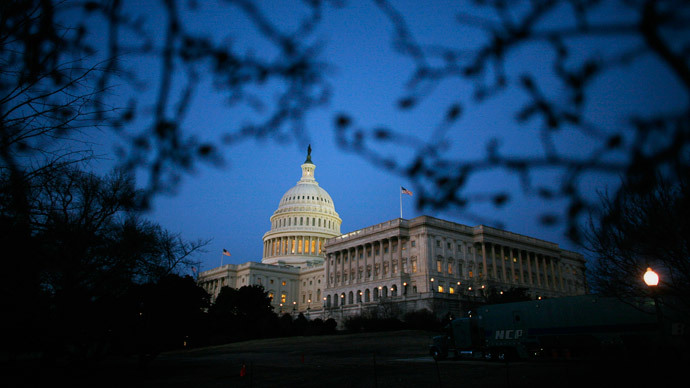US House of Representatives passes NSA reform bill

The United States House of Representatives approved a surveillance reform bill early Thursday that aims to address controversial National Security Agency programs but falls well short of doing so, according to privacy advocates.
In Washington, DC, the House voted 303-to-121 on Thursday morning in favor of the USA Freedom Act, which includes a provision that the bill’s authors say will halt the US government’s bulk collection of telephone metadata.
One day earlier, the White House endorsed the bill and said in a statement that its “significant reforms would provide the public greater confidence in our programs and the checks and balances in the system.”
“It ends collection of all bulk metadata by the government,” Rep. Dutch Ruppersberger (D-Maryland) a supporter of the bill, told his colleagues on the floor of Congress before Thursday’s vote.
According to an outline provided by the bill’s authors, if approved the act would “rein in the dragnet collection of data by the National Security Agency (NSA) and other government agencies, increase transparency of the Foreign Intelligence Surveillance Court (FISC), provide businesses the ability to release information regarding FISA requests and create an independent constitutional advocate to argue cases before the FISC.”
In its current form, however, critics say it lacks the sufficient provisions to truly put a dent in the NSA’s spy programs. The Electronic Frontier Foundation this week accused the latest version of the act to have been “gutted” of its most crucial parts and “doesn't achieve the goal of ending mass spying.”
Although the USA Freedom Act originally contained provisions that would allow companies to more fully discuss requests for data they receive from the government and install a civil liberties advocate to audit the FISA Court’s operations, those were removed ahead of Thursday’s vote.
“We are glad that the House added a clause to the bill clarifying the content of communications cannot be obtained with Section 215,” the EFF said in a statement on Tuesday, referring to the Patriot Act provision that opened the door for the NSA’s current operations. “Unfortunately, the bill's changed definitions, the lack of substantial reform to Section 702 of the Foreign Intelligence Surveillance Amendments Act and the inability to introduce a special advocate in the FISA Court severely weakens the bill.”
"This legislation was designed to prohibit bulk collection, but has been made so weak that it fails to adequately protect against mass, untargeted collection of Americans' private information," added Nuala O'Connor, the president and CEO of the Center for Democracy and Technology.
The version of the bill, Rep. Zoe Lofgren (D-California) told The Hill this week has “a secret change made that seems to open the door to bulk collection again” and “doesn’t really create any improvement over the current situation,”
“In fact, it’s probably worse,” Lofgren told the Hill.
Nevertheless, supporters said throughout House discussions Thursday morning ahead of the vote that the bill is a perfect example of not just bipartisan cooperation, but meeting in the middle with regards to the concerns raised on both ends of the issue.
“This bill strikes the balance to allow this transparency for civil liberties but while it underscores the ability of our intelligence community to do their job,” insisted Rep. Frank LoBiondo (R-New Jersey).
In an editorial published by The Guardian on Thursday, Freedom of the Press Foundation board member Trevor Timm wrote that that the Senate still is capable of implement real surveillance reform if that make the right moves.
“We still a chance that the Senate could hold strong and pass the original USA Freedom Act – the one with real transparency and FISA court reform – then pass it back to the House with an ultimatum,” he wrote. “But it will take a massive effort by ordinary citizens to call their Senators with a litany of demands: a prohibition on all forms of bulks surveillance, no more secret law and a privacy advocate in the secret FISA court. Tech companies should be focusing all their lobbying power on adding back in the provision allowing them to spell out to their customers exactly how many people are affected by all types of surveillance and a bar on breaking common forms of encryption used by all internet users.”














